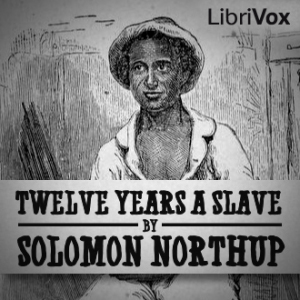The Influence of Habit and Associations - On Listening to the book Twelve Years A Slave
 Librivox Recording of Twelve Years A Slave "I don't want to survive, I want to live.” ― Solomon Northup, Twelve Years a Slave
Librivox Recording of Twelve Years A Slave "I don't want to survive, I want to live.” ― Solomon Northup, Twelve Years a Slave This is a slave narrative and I listened to it on LibriVox narrated by Rob Board. The quality of the recording was very good and, for me, the narrator's British accent did not detract from his skill as an evocative reader.
I would agree with the comment that although this is a narrative, the book "reads" like a novel. Northup includes not only detailed descriptions about what happened to him and the general lifestyle of places where he lived before and after bondage, but he also provides his reflections on the internal thoughts and feelings of the persons around him.
One often quoted passage from the book that shows his capacity to reflect is: "It is not the fault of the slaveholder that he is cruel, so much as it is the fault of the system under which he lives. He cannot withstand the influence of habit and associations that surround him. Taught from earliest childhood, by all that he sees and hears that the rod is for the slave's back, he will not be apt to change his opinions in maturer years."
Northup seems to be more naturally inclined to be immersed in the emotions of the women who were around him, in contrast to the many men who actually influenced the course of his life. The heart of Eliza, who he described as having a "natural intelligence", "broke with the burden of maternal sorrow."
Patsey was "a joyous creature, a laughing, light-hearted girl". When Northup was removed from bondage she was genuinely happy for him, even as she lamented her own situation. “Oh! Platt, you’re goin to be free – you’re goin’ way off yonder where we’ll neber see ye any more. You’ve saved me a good many whipping Platt; I’m glad you’re goin’ to be free – but oh! De Lord, de Lord! What’ll become of me”.
He even has sensibility for the estate owner's wife Mrs Epps, the wife of the estate owner, whose jealous malice is well detailed. Northup says, "In other situations – in a different society from that which exists on the shores of Bayou Boeuf, she would have been pronounced an elegant and fascinating woman. An ill wind it was that blew her into the arms of Epps."
More than any other matter in the book, however, I am reminded that when human potential is not developed, it holds a society back from natural advancement. Throughout the book, Northup's education and life experiences before he was enslaved, enriched and advanced his slave society.
These include his ability to play the violin well; his knowledge in how to move logs down a river using a cart pulling a raft; his skill in making an angled axe handle; his carpentry skills that led to an ingenious fish pot; and of course that he was literate.
A society that does not develop its people, I think, is at greater risk of becoming dismantled and assimilated by stronger societies. It has been documented that in the English speaking Americas, the ratio of enslaved to free citizen was sometimes 10:1. Based on descriptions by Northup, the enslaved far outnumbered the free white people, so much underused potential.
This situation brings to mind the book of Daniel in the Bible, where a Babylonian king, Nebuchadnezzar, insisted that talented enslaved boys were educated because he saw where they could help to develop his society.
The Southern states of the USA, during the centuries of plantation slavery, put themselves at a clear disadvantage, in part, because their enslaved people were not educated, and their free citizens devoted their time and effort to maintaining the debasing system of slavery. Despite generating great wealth, could it be successfully argued that these societies led the USA in the advancement of their civilization? In their philosophy, science or art? Is this where the teeming masses from Europe headed when their own societies had not provided opportunity for advancement?The effect of inducting children in maintaining the slave society was shown in Northup's description of the attitude of the estate owner's young son towards an elderly enslaved man.
"Epps' oldest son is an intelligent lad of ten or twelve years of age, it is pitiable, sometimes, to see him chastising, the venerable Uncle Abraham."
This behaviour reinforces the system of wasting away the spirit and talent of vibrant, but enslaved people. In December 1943, the book A Christmas Carol by Charles Dickens was published. In one scene the Ghost of Christmas Present reveals his emaciated and hideous children Ignorance and Want. Ten years later in 1953, Northup's words seem harsh where he describes the enslaved Mary.
"Brought up in the ignorance of a brute, she possessed but little more of a brute's intelligence."
This is another argument for the essential nurturing and education of children and in people whatever their abilities and situations.Twelve Years A Slave reminds us of the dangers of stagnation and neglect of populations of people. Societies that do not provide opportunities will not advance, but will lose their most talented and most ambitious citizens to ignorance or to some form of migration.The book ends on a positive note when Northup is restored to his freedom and reunited with his family. When it was published, the book was popular and it supported a general discussion on the evils of slavery, but unfortunately, the discussion did not result in dismantling of the slave system by peace, but it was ten years later through armed strife in the American Civil War.
The effects of the entrenched slave system are still being felt today across regions where enslavement for economics was practiced, and still too much human potential is still not being realised. I think that this book is a good addition to a Young Adult reading list.-30- The Influence of Habit and Associations - other books A Christmas Carol - Charles Dickens - Life devoted to moneymaking more than peopleThe Great Gatsby - Fitzgerald F. Scott - Desire to be accomplished dictates associationsThe Picture of Dorian Gray - Oscar Wilde - The ego determined the associationsGone With the Wind - Margaret Mitchell - Lifestyle determined outcomes in a time of changeLord of the Flies - William Golding - How boys change and remain the same due to environmentAnimal Farm - George Orwell - Using habits and associations as controlMacbeth - William Shakespeare - Effect of family associations on a personJulius Caesar - William Shakespeare - Ego determined the associationsFor Nothing At All - Garfield Ellis - Lifestyle determined the outcomesEleven Minutes - Paulo Coelho - Fear of failure determined the associationsThe God of Small Things - Arundhati Roy - Lifestyle restricts the outcomesSense and Sensibility - Jane Austen - Lifestyle restricts outcomesPride and Prejudice - Jane Austen - Lifestyle restricts outcomesWhispering Death - Michael Holding - Associations determined the successSong of My Life: A Biography of Margaret Walker - Carolyn J Brown - Associations determined successBad Girls in School - Gwyneth Harold - Lifestyles determined outcomesYoung Heroes of the Caribbean - Gwyneth Harold - Lifestyle and associations determined outcomes
Published on February 12, 2016 08:27
No comments have been added yet.



